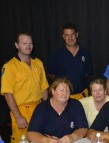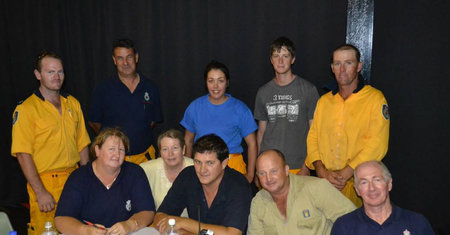First responders living on the edge as fires rage
Published Date: 22 Jan 2013

Summary
Daily Liberal By ABANOB SAAD
HOW WOULD you feel if you were responsible for a team of firefighters who were battling the worst bushfires in the state this summer?
For Coonabarabran Fringe Rural Fire Brigade captain David McWhirter this has been the reality for the past few days.
 The Coona Fringe Rural Fire Brigade quick
response team at the rescue centre. (Back) James Grant, Captain David McWhirter,
Natalie Trow, Adam Pascoe and Harold Birrell, (front) president Caron Harris, Jo
Barrett, Darren Harris, Robert Lines and Ken Zingel.
The Coona Fringe Rural Fire Brigade quick
response team at the rescue centre. (Back) James Grant, Captain David McWhirter,
Natalie Trow, Adam Pascoe and Harold Birrell, (front) president Caron Harris, Jo
Barrett, Darren Harris, Robert Lines and Ken Zingel.
As the Daily Liberal interviewed Mr McWhirter, the president of the brigade Caron Harris was holding the scanner close to her ear and nervously waiting to hear if they needed to run to fight fires.
Mr McWhirter said the brigade was always first on scene if there was an incident because they knew the town well.
"Since (last) Sunday no-one has slept," he said.
"On Monday, we worked 36 hours, pretty much straight because we were the only crew at that time. For the rest of the week, we've been flat out."
Although they were resting at the Coonabarabran rescue centre, the quick response team was on standby to put a fire out at any time.
"We sit here now, relaxed and joking but as soon as we're called we jump into the truck and we don't know what we're going into - it's pretty intense," he said.
Mr McWhirter told the Daily Liberal he might need to cut the interview short in order to respond to the seemingly unending lightning strikes which had caused several new fires.
"It used to never scare me, but now, it really scares me," he said.
"It makes me tense, not the lightning itself but the aftermath. I dread it."
Despite the loss of livestock and properties, the captain said his team remained strong and upbeat.
The most difficult moment of fighting the worst bushfires in the state was seeing the devastation of people's property.
"It's gut-wrenching," he said.
"It is a lot worse when you know the people. Even if you don't know them just driving through the houses ripped through by the fires is difficult."
The captain said there were times when he had to decide to leave a place which was undefendable and too risky to leave his crew to fight the fire.
"Maybe you saved their house, maybe you didn't and then you go through the what if thoughts," he said.



